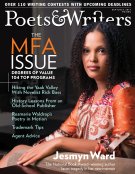In 1809 Washington Irving published the first issue of Salmagundi; or, The Whim-whams and Opinions of Launcelot Langstaff, Esq. & Others, an influential but short-lived early American miscellany of criticism, poetry, stories, and satire. Nearly two centuries later, in a 1984 essay on literary magazines, Missouri Review cofounder Eric Staley noted that the title Salmagundi (a word meaning a salad of chopped meat, anchovies, eggs, and onions) “could be the generic label, perhaps of most literary magazines”—a comment with which Robert Boyers, the founder of Salmagundi (cms.skidmore.edu/salmagundi) would likely agree. Established in 1965 and published since 1969 at Skidmore College in Saratoga Springs, New York, Salmagundi is a self-defined “savory dish, liberally salted, and distinguished by a wide-ranging mix of ingredients,” a high-caliber literary quarterly that routinely publishes essays, reviews, interviews, fiction, poetry, polemics, and debates from leading writers. The most recent, double issue (178–179) includes columns on international politics by Tzvetan Todorov and Dubravka Ugres˘ic´, new fiction from Mary Gaitskill, and poetry from Charles Simic and Emily Barnard. With more than four decades of quality print work under its belt, Salmagundi recently launched a new Tumblr page (salmagundimagazine.tumblr.com), which features both in-print and original content, including a “stochastic and sublime and sometimes silent” recording of Rick Moody reading his essay on John Cage from the current issue. Submissions to the magazine are accepted by e-mail; the next reading period is February 1 through April 15, 2014.
In San Francisco, Wendy Lesser has since 1980 been putting out the eclectically curated newsprint quarterly the Threepenny Review (www.threepennyreview.com), publishing a diversity of work ranging from music criticism—such as Aaron Gilbreath’s insightful recent essay on jazz organist Jimmy Smith—to cultural commentary from international authors Javier Marías and Elvis Bego. Since the beginning, Lesser has wanted Threepenny to offer a broad reading experience: “poems, prose, and book reviews, of course, but also pieces on the performing arts and visual arts, the occasional political piece.” The Fall 2013 issue continues this trend, with a symposium on revenge with contributions by Geoff Dyer, Louise Glück, James Lasdun, Adam Phillips, and Robert Pinsky; poetry from Wendell Berry and Kay Ryan; and essays on the lockdown after the Boston Marathon and on suicide as a contemporary social problem. Submissions are considered by mail and through an online submissions system from January through June.
The Georgia Review (garev.uga.edu) offers a similar amalgam of literature and criticism. Founded in 1947 and published quarterly by the University of Georgia in Athens, the Georgia Review includes a mix of poetry, art, fiction, essays, and reviews; editor Stephen Corey firmly believes that such “interwoven and interdisciplinary thinking and writing” represented by the journal “are vital to the preservation and survival of our culture, arts, and environment.” The Summer 2013 issue features the long-form essay “The Circus Train” by Judith Kitchen, new poetry from Bruce Bond and Sharon Dolin, and fiction from David Griffith. The Georgia Review considers submissions by mail from August 16 until May 14 each year.
In his introduction to a recent issue of the Seattle Pacific University–based journal Image (imagejournal.org), founding editor Gregory Wolfe offers a more specific reason for curatorial variety, hearkening back to a time when religious and secular thinkers shared public platforms. “That almost never happens today,” Wolfe writes, “[but] I sense a conversation waiting to happen.” Image serves to bring about this conversation, offering a range of poetry, fiction, nonfiction, visual art, and criticism “shaped by the faith and traditions of Western civilization.” The Spring 2013 issue includes new fiction from John Biguenet, poetry from Claire Bateman and Scott Cairns, and an essay by Peggy Rosenthal on reading Simone Weil. Keep an eye out for Image’s redesign with its next issue, and a twenty-fifth-anniversary issue next spring. Image accepts submissions and queries year-round by mail.
Travis Kurowski is the editor of Paper Dreams: Writers and Editors on the American Literary Magazine, published in August by Atticus Books. His website is traviskurowski.com.









